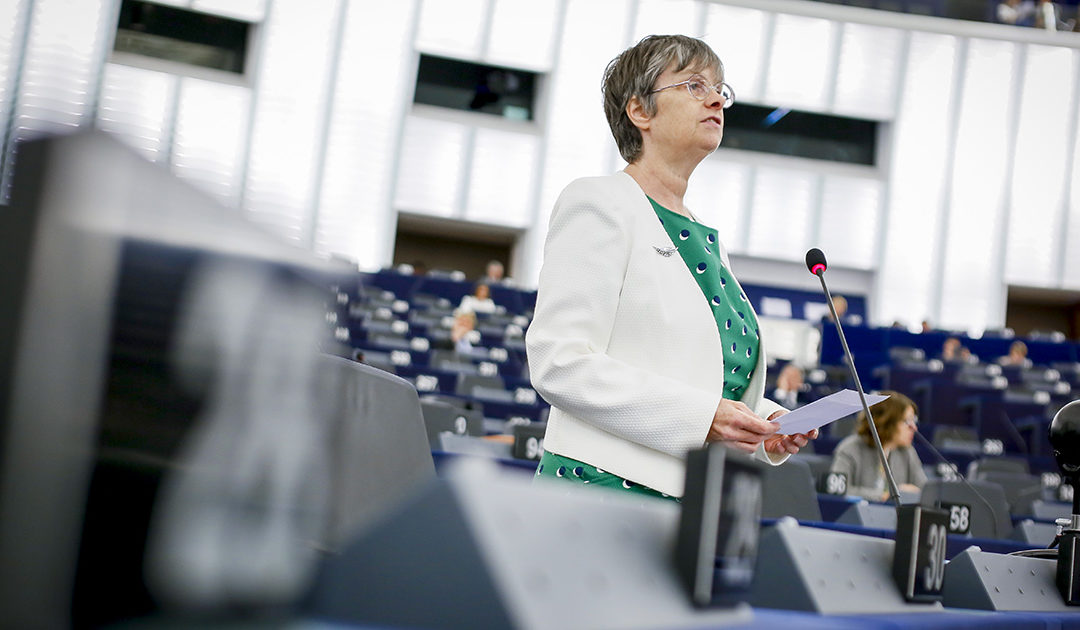In a report on “Sustainable Finance”, the European Parliament recommends the inclusion of environmental and social criteria into the European Central Bank’s corporate quantitative easing programme.
On May 29th, the European parliament adopted by a large majority an initiative report on Sustainable Finance. The report, which was led by Green Member of the European Parliament Molly Scott-Cato, aims at clarifying the Parliament’s position on the European Commission action plan on “financing sustainable growth”. While the report is supportive of the Commission’s plan, it goes much further notably by including monetary policy in the scope of the sustainable finance agenda – a topic which so far has been overlooked by the Commission.
In the report, the Parliament echoes our long-standing concerns regarding the environmental impact of the ECB’s Corporate Sector Purchase Programme (CSPP) – a 160 billion euro programme which mainly benefits polluting multinationals. By channelling new money towards carbon-intensive companies, the ECB’s CSPP goes in direct contradiction to the EU’s ambitions on climate change as set out by the Paris agreement. In response, the European Parliament “recommends the ECB to explicitly take into account the Paris Agreement and ESG goals in its guidelines orienting its purchase programmes”.
The report also lends support to the proposal made by the High-Level Expert Group on Sustainable Finance mandated by the Commission to prepare recommendations, for an EU observatory on sustainable finance to “take on a role in tracking, supporting and disclosing information on sustainable investments of EU funds and EU institutions, including EFSI, the EIB and the ECB“.
With the notable exception of MEPs from liberal and conservative groups (ALDE and ECR), a very large majority of MEPs adopted the report, showing increasing support for sustainable finance, including the role of the ECB. Positive Money Europe has been pro-actively supportive of the work of MEPs working on those issues. We are pleased that Molly Scott-Cato’s report has been adopted.
.@MollyMEP report on #SustainableFinance is adopted by @Europarl_EN including commitment to #GreenFinanceMark to help us identify #Green #Investments 🌱💶 pic.twitter.com/wYFNiRMQR0
— Cory (@cfletch2289) May 29, 2018
While the report isn’t legally binding, it constitutes another important step towards ensuring ECB policies contribute to building a sustainable finance system which serves people and the planet. Some central banks in Europe and elsewhere are taking the lead on climate change and sustainable finance by deploying a large range of concrete action (macroprudential policy, credit guidelines, etc.). But the ECB has been constantly lagging behind as a consequence of the lack of political recognition of its impact and potential positive role.
Is the ECB finally going green?
Confronting the ECB’s apparent lack of commitment to support the EU’s environmental goals, MEPs have been ramping up the pressure over recent months, through multiple parliamentary interventions and letters. In February, criticism of the ECB materialized in the adoption of a resolution recalling that the ECB, just like any other EU institution, is legally bound by the Paris agreement on climate change.
It looks as if those multiple actions are finally having an effect.
In late February, the ECB President Mario Draghi was compelled by Socialist MEP Paul Tang to recognize that the “the ECB is party to the Paris Agreement” on climate change. Draghi went on to say that the ECB “recognises the challenge posed by climate change and the importance of policies aimed at addressing it.” This recognition means the ECB does not just have a moral duty to support policies that are compatible with sustainability, it also has a legal duty to do so. In another letter, a group of Socialist MEPs have also asked the ECB to produce an analysis of the climate impact of its QE programme.
It looks like the ECB is slowly taking steps to put those words into action. Coincidentally or not, on the same day as the Parliament adopted the sustainable finance report, it was announced that the ECB had joined the Network for Greening the Financial System (NGFS) – a group of central banks and financial supervisors launched in December 2017 from which the ECB was blatantly absent until now. Among other things, the NGFS tasks include to “examine the current practices of central banks and supervisors to incorporate ESG criteria in their operational activities and their involvement in monitoring market conditions and developments and also outlines the role that central banks and supervisors could play in scaling up green finance.”
“Given the direct implications that environmental risks and the transition to a sustainable economy could have for financial regulation and financial stability more generally, it is very valuable for the ECB to join the NGFS and actively contribute to its work going forward,” Mario Draghi said.
It is positive to see the ECB catching up on this issue. Positive Money Europe encourages the work of the NGFS and is committed to ensuring the ECB adjusts its monetary policy programme to be fit for the necessary transition to a low-carbon economy. If the EU is serious about building a sustainable finance system, its institutions such as the ECB must lead by example.
Credit Picture © European Parliament


but most decision taking takes place among company directors who can seldom see beyond short term gains, mostly for themselves through indexing their emoluments on next year market rates